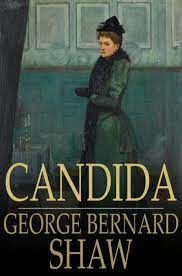Candida By George Bernard Shaw
“Candida” by George Bernard Shaw is a compelling play that offers a satirical and thought-provoking examination of love, marriage, and societal expectations. First performed in 1895, the play delves into the complexities of relationships and challenges traditional gender roles, presenting a refreshing and progressive take on the institution of marriage. Through witty dialogue, memorable characters, and sharp social commentary, “Candida” continues to captivate audiences and provide insight into the dynamics of human connections.
Summary Of Candida
“Candida” by George Bernard Shaw is a satirical play that examines love, marriage, and societal expectations. Set in the late 19th century, the play revolves around Candida, her husband Reverend James Morell, and the young poet Eugene Marchbanks. As Marchbanks declares his love for Candida, the play explores the complexities of relationships, gender roles, and personal fulfillment.
Shaw’s witty dialogue and sharp social commentary shed light on the limitations imposed by societal norms. Candida, the central character, challenges traditional gender roles as an intelligent and independent woman who knows her own desires. Candida By George Bernard Shaw Reverend Morell initially represents a progressive clergyman, but his character reveals the limitations of conventional masculinity. Marchbanks, the poet, disrupts the established order and questions the nature of love and personal fulfillment.

Shaw’s writing style is marked by intellectual dialogue and a mix of comedy and satire. He uses humor to explore serious social issues, inviting the audience to question their beliefs and the expectations placed on men and women. Candida By George Bernard Shaw The play’s social commentary on love, marriage, and gender roles remains relevant today, as it prompts reflection on equality, emotional connection, and personal autonomy within relationships.
“Candida” offers a fresh and progressive perspective on love and marriage. Shaw’s exploration of power dynamics, personal fulfillment, and true love engages the audience, providing both entertainment and thought-provoking insights. Candida By George Bernard Shaw The play serves as a testament to Shaw’s skill as a playwright and his ability to tackle complex social issues with humor and intelligence.
Also Read-
- Silas Marner by George Eliot
- The Secret Garden by Frances Hodgson Burnett
- The Adventures of Tom Sawyer by Mark Twain
Through the lens of “Candida,” Shaw encourages the audience to challenge societal expectations and embrace genuine emotional connections. Candida By George Bernard Shaw The play prompts reflection on the nature of relationships and the importance of personal autonomy and fulfillment. Shaw’s satirical examination of love, marriage, and gender roles invites the audience to question established norms and consider alternative perspectives.
Themes and Character Analysis
“Candida” delves into various themes, including love, marriage, gender roles, and societal expectations. Shaw’s sharp social commentary and satirical approach shed light on the limitations imposed by societal norms and challenge the traditional notions of love and marriage.
Candida, the central character, is portrayed as an intelligent, independent woman who possesses a keen understanding of her own desires and needs. She serves as a catalyst for the conflicts that arise within the play, prompting both Morell and Marchbanks to question their beliefs and examine the authenticity of their feelings. Candida embodies Shaw’s vision of a modern woman who defies convention and challenges the established order.
Reverend James Morell, Candida’s husband, represents the archetype of a progressive clergyman. Candida By George Bernard Shaw While initially presented as a champion of social reform, he is revealed to be somewhat oblivious to Candida’s emotional needs and desires. Morell’s character reflects the play’s critique of conventional masculinity and highlights the importance of genuine emotional connection within a relationship.
Eugene Marchbanks, the young poet infatuated with Candida, provides a contrasting perspective on love and marriage. Marchbanks challenges the idea of the male provider and romanticizes the notion of passion and intensity in relationships. Candida By George Bernard Shaw His character represents the disruptive force that confronts the established order and raises questions about the true nature of love and personal fulfillment.
Writing Style and Social Commentary
George Bernard Shaw’s writing style in “Candida” is characterized by witty and intellectual dialogue, marked by a mix of comedy and satire. Candida By George Bernard Shaw The play’s dialogue-driven narrative engages the audience through its sharp observations and critical examination of societal norms. Shaw employs humor to explore serious social issues, inviting the audience to question and reevaluate their own beliefs.
Through the lens of “Candida,” Shaw offers social commentary on the dynamics of love, marriage, and societal expectations. Candida By George Bernard Shaw He challenges the traditional roles assigned to men and women, highlighting the need for equality, emotional connection, and personal fulfillment within relationships. Shaw’s exploration of gender roles and the limitations of societal conventions in the context of love and marriage remains relevant and thought-provoking even in contemporary society.
Conclusion
“Candida” by George Bernard Shaw is a captivating play that delves into the complexities of love, marriage, and societal expectations. Shaw’s satirical approach and sharp social commentary challenge traditional gender rolesand invite the audience to question established norms. Candida By George Bernard Shaw Through the characters of Candida, Morell, and Marchbanks, Shaw explores the dynamics of power, personal fulfillment, and the pursuit of true love.
The play’s witty dialogue and intellectual exchanges engage the audience, providing both entertainment and thought-provoking insights. Shaw’s exploration of gender roles and the limitations imposed by societal expectations remains relevant in today’s society, prompting reflection on the nature of relationships and the importance of emotional connection and personal autonomy.
“Candida” serves as a testament to Shaw’s skill as a playwright and his ability to tackle complex social issues with humor and intelligence. Candida By George Bernard Shaw With its spirited exploration of love and marriage, the play continues to captivate audiences, offering a fresh and progressive perspective on the intricacies of human connections.
FAQ.
Q: Who is the author of “Candida”?
A: The author of “Candida” is George Bernard Shaw.
Q: When was “Candida” first performed?
A: “Candida” was first performed in 1895.
Q: Can you provide a brief summary of “Candida”?
A: “Candida” is a satirical play that revolves around Candida, her husband Reverend James Morell, and the poet Eugene Marchbanks. The play explores the complexities of relationships as Marchbanks declares his love for Candida, prompting a reevaluation of love, marriage, and societal expectations. The witty dialogue and social commentary challenge traditional gender roles and invite the audience to question their beliefs and the limitations imposed by society.
Q: How does “Candida” address gender roles?
A: “Candida” challenges traditional gender roles through the character of Candida, who defies societal expectations as an intelligent and independent woman. The play prompts reflection on the limitations imposed by gender roles and emphasizes the importance of equality and personal autonomy within relationships.
Q: Why is “Candida” still relevant today?
A: “Candida” remains relevant today due to its exploration of love, marriage, and gender roles. The play invites the audience to question established norms and consider alternative perspectives on relationships. Its social commentary on societal expectations and the pursuit of personal fulfillment resonates in contemporary society.
















